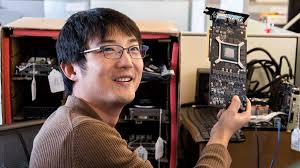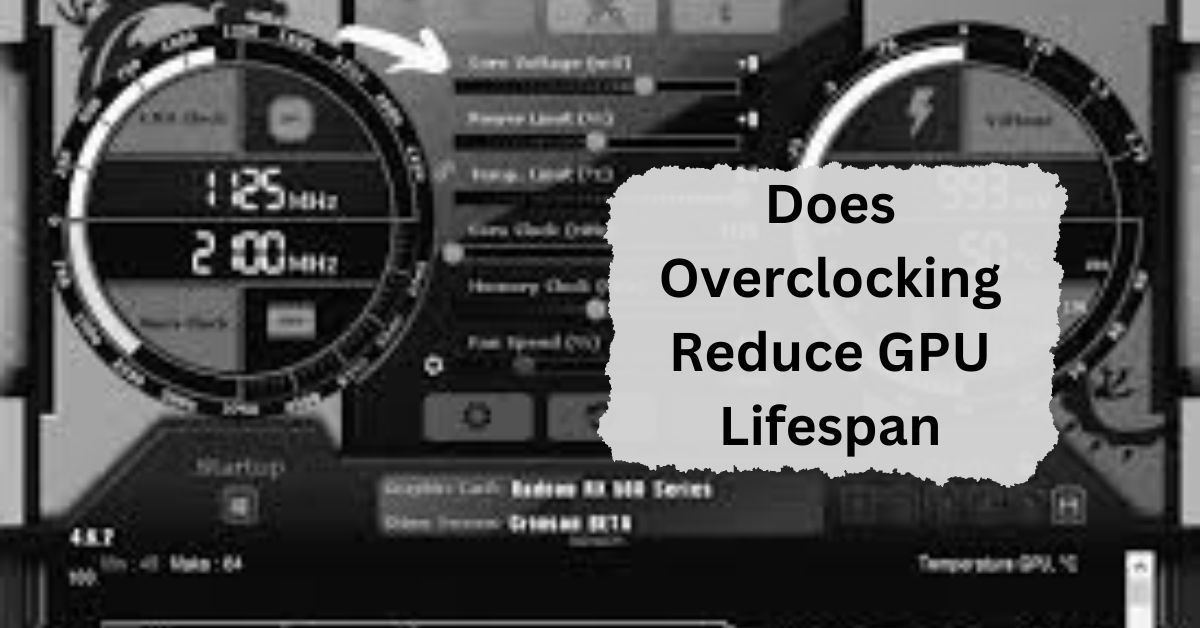Overclocking can be an exciting way to push your GPU’s performance beyond its default capabilities. But is it safe for your graphics card in the long run? Many people wonder if this practice could reduce their GPU’s lifespan.
Overclocking can reduce a GPU’s lifespan, especially if done without proper cooling. It generates more heat and stress on the GPU, which can lead to faster wear. However, with careful overclocking and good cooling, the impact on lifespan is typically minimal.
In this article, we will article we will discuss the query “ Does Overclocking Reduce GPU Lifespan”.
Table of Contents
What Is GPU Overclocking?
GPU overclocking is when you make your graphics card run faster than its normal speed. This can improve performance in games or other tasks that need high graphics power.
Overclocking can also make your GPU hotter, so it’s important to watch temperatures and ensure your system stays cool to avoid damage.
How Does Overclocking Work?
Overclocking works by increasing the clock speed of your GPU or CPU. This means the hardware runs faster, processing more tasks in less time. To overclock, you use special software to raise the clock speed and voltage.
However, overclocking can cause extra heat, so you need good cooling to avoid problems like overheating or system crashes.
Is Overclocking Safe?
Overclocking can be safe if done carefully. Using proper cooling and monitoring temperatures can help prevent overheating.
However, pushing the GPU or CPU too much can cause crashes or damage over time. Beginners should start with small changes and use trusted software to avoid problems. Keep in mind, that overclocking may void your hardware warranty.
The Impact of Overclocking on GPU Lifespan?
Overclocking can reduce your GPU’s lifespan because it increases heat and stress on the hardware. Running at higher speeds for long periods may cause wear and tear over time.
However, if you use good cooling and avoid extreme overclocking, the impact on lifespan can be small. It’s important to monitor temperatures and not push the GPU too hard.
Causes of overclocking:
Here are the causes of overclocking in points:
- Improved Performance: Users seek better performance in games and demanding applications.
- Higher Frame Rates: Gamers want smoother graphics and more frames per second.
- Cost Savings: Users may overclock older hardware instead of buying new components.
- System Experimentation: Some people enjoy testing their systems and pushing performance limits.
- Competitive Edge: Overclocking can provide an advantage in competitive gaming.
Tips for reducing overclocking:
Here are some tips for reducing overclocking:
- Lower Clock Speeds: Gradually reduce the clock speed in your settings until you find a stable level.
- Decrease Voltage: Lowering the voltage can reduce heat and power usage, but do it carefully to avoid crashes.
- Check Cooling Solutions: Ensure your cooling system is adequate. Upgrade fans or use liquid cooling if needed.
- Monitor Temperatures: Use software to keep an eye on GPU and CPU temperatures, aiming for safe levels.
- Revert to Default Settings: If you experience issues, restoring factory settings is a safe option.
- Regularly Clean Components: Dust buildup can affect cooling. Clean your PC to maintain airflow.
- Avoid Extreme Settings: Steer clear of extreme overclocking settings that push your hardware too hard.
How Is The GPU Affected When You Overclock It?
- Increased Performance: Overclocking can boost frame rates and improve graphics quality in games and applications.
- Higher Heat Generation: Running at higher speeds generates more heat, which can lead to overheating if not properly managed.
- Potential Instability: Overclocking may cause system crashes or errors if the settings are too aggressive or if cooling is inadequate.
- Shorter Lifespan: Prolonged overclocking can wear out the GPU faster due to increased stress and heat.
- Need for Better Cooling: To maintain performance and stability, you may need to upgrade your cooling solution.
Thermal Management During Overclocking:
Importance of Cooling Solutions:
Cooling is critical when overclocking a GPU. Without proper cooling, the additional heat generated by overclocking can cause long-term damage. This is why many people invest in better cooling systems, like aftermarket air coolers or liquid cooling setups.
How to Manage Heat Levels:
To keep your GPU running safely during overclocking, you need to manage heat levels. Monitoring tools like HWMonitor or GPU-Z can help you track your temperatures in real time.
Air Cooling vs. Liquid Cooling:
While air cooling is usually sufficient for moderate overclocking, liquid cooling can offer better thermal performance. Liquid cooling systems are more efficient at dissipating heat but are also more expensive and complex to install.
Manufacturers’ Perspective on Overclocking:
Warranty and Overclocking:
Many manufacturers allow overclocking but may place limits on what’s covered under warranty. In some cases, overclocking can void your warranty, particularly if it results in damage from overheating or excessive voltage.
Does Overclocking Void GPU Warranties?
This depends on the manufacturer. Some brands, like NVIDIA and AMD, provide some level of overclocking support through their software but often warn that pushing components too far may void warranties.
Safe Overclocking Practices:
Keeping Overclocking Within Safe Limits:
One way to minimize the risks of overclocking is to stay within safe limits. Don’t push your GPU to its absolute maximum. A moderate overclock is usually enough to see performance gains without significantly reducing lifespan.
Using Reliable Overclocking Tools:
It’s important to use reliable tools when overclocking your GPU. Applications like MSI Afterburner and ASUS GPU Tweak are commonly recommended for their stability and ease of use.
Monitoring Software for Safe Operation:
Always monitor your system when overclocking. Software like GPU-Z or HWMonitor can provide real-time information about clock speeds, temperatures, and power usage, helping you make sure everything stays within safe levels.
What Measures Can Be Taken To Increase A GPU’s Lifespan?
To increase a GPU’s lifespan, keep it clean from dust, ensure proper cooling with fans or liquid cooling, avoid overclocking, maintain optimal temperatures, and update drivers regularly. A stable power supply also helps protect your GPU.
Does Overclocking GPU Increase FPS?
Yes, overclocking a GPU can increase FPS (frames per second) in games. By raising the GPU’s clock speed, it can process more data quickly. However, results vary depending on the GPU model and cooling solutions used.
Does Overclocking Increase FPS?
Yes, overclocking can increase FPS by making the GPU run faster. This allows for better performance in games and applications. However, the increase in FPS may not be very noticeable in all scenarios or games.
How to Overclock GPU?
To overclock a GPU, use software like MSI Afterburner or EVGA Precision X1. Increase the core clock and memory clock speeds gradually, test for stability and temperatures, and monitor performance. Always ensure proper cooling during the process.
Does Overclocking Increase Heat?
Yes, overclocking increases heat output from the GPU. Higher clock speeds generate more heat, which can lead to overheating if not managed properly. It is essential to monitor temperatures and ensure adequate cooling when overclocking.
Does Overclocking GPU Void Warranty?
Overclocking can void the warranty of some GPUs, but it depends on the manufacturer. Many companies state that damage from overclocking is not covered. Always check the warranty terms before overclocking to avoid issues.
Does Overclocking Affect GPU Lifespan?
Yes, overclocking can affect GPU lifespan. Running the GPU at higher speeds generates more heat, which can lead to wear and tear over time. Keeping temperatures low and using proper cooling can help mitigate this risk.
Does Overclocking Ruin Your GPU?
Overclocking does not necessarily ruin a GPU, but it can cause damage if done incorrectly or without adequate cooling. Excessive heat and voltage can lead to failures. Proceed with caution and monitor temperatures when overclocking.
What Reduces GPU Lifespan?
Factors that reduce GPU lifespan include high temperatures, dust buildup, lack of proper cooling, overclocking, and power supply issues. Regular maintenance and monitoring of temperatures can help extend the lifespan of your GPU.
Is It OK to Leave GPU Overclocked?
Leaving a GPU overclocked is generally not recommended for daily use. While it can provide better performance, it may also increase heat and wear. If stability and temperatures are managed well, occasional overclocking can be fine.
Does Overclocking Reduce CPU Lifespan?
Overclocking can reduce CPU lifespan due to increased heat and voltage stress. Just like with GPUs, pushing components beyond their rated speeds can lead to faster degradation. Proper cooling and monitoring are essential to prevent damage.
FAQs:
Does overclocking a GPU void its warranty?
Yes, overclocking can void your GPU’s warranty, depending on the manufacturer. Always check the warranty policy.
Can overclocking damage a GPU instantly?
If done recklessly without proper cooling, overclocking can cause immediate damage, but this is rare. It’s more likely to cause long-term wear.
What are safe temperature limits for overclocked GPUs?
Ideally, keep your GPU under 85°C during overclocking. Anything higher can cause damage over time.
How can I tell if my GPU is stable after overclocking?
Use stress testing tools like FurMark to check the stability. If your GPU crashes or produces artifacts, it’s not stable.
Is overclocking worth it for older GPUs?
For older GPUs, the performance gains may be minimal, making overclocking less worthwhile.
Conclusion:
In conclusion, overclocking can improve GPU performance, but it may also reduce its lifespan due to increased heat and stress. To keep your GPU healthy, use proper cooling and monitor temperatures. If done carefully, overclocking can be safe but always consider the risks and the potential impact on your hardware.

I’m Noah Lucas, the voice behind the content you find here. With 5 years of experience in the GPU field, my goal is to provide clear and helpful information to everyone interested in this technology.
Whether you’re new to GPUs or looking to deepen your understanding, my articles aim to break down complex topics into simple, easy-to-understand language. This way, no matter where you’re from, you can find the information you need without any confusion.

